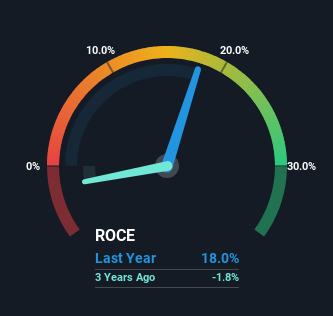- United States
- /
- Entertainment
- /
- NasdaqGS:WMG
Warner Music Group (NASDAQ:WMG) Might Have The Makings Of A Multi-Bagger

If we want to find a stock that could multiply over the long term, what are the underlying trends we should look for? Firstly, we'll want to see a proven return on capital employed (ROCE) that is increasing, and secondly, an expanding base of capital employed. Put simply, these types of businesses are compounding machines, meaning they are continually reinvesting their earnings at ever-higher rates of return. So when we looked at Warner Music Group (NASDAQ:WMG) and its trend of ROCE, we really liked what we saw.
Understanding Return On Capital Employed (ROCE)
For those that aren't sure what ROCE is, it measures the amount of pre-tax profits a company can generate from the capital employed in its business. The formula for this calculation on Warner Music Group is:
Return on Capital Employed = Earnings Before Interest and Tax (EBIT) ÷ (Total Assets - Current Liabilities)
0.18 = US$942m ÷ (US$9.0b - US$3.7b) (Based on the trailing twelve months to December 2023).
Therefore, Warner Music Group has an ROCE of 18%. On its own, that's a standard return, however it's much better than the 9.1% generated by the Entertainment industry.
See our latest analysis for Warner Music Group

In the above chart we have measured Warner Music Group's prior ROCE against its prior performance, but the future is arguably more important. If you'd like, you can check out the forecasts from the analysts covering Warner Music Group for free.
What The Trend Of ROCE Can Tell Us
Warner Music Group is displaying some positive trends. The numbers show that in the last five years, the returns generated on capital employed have grown considerably to 18%. The amount of capital employed has increased too, by 56%. This can indicate that there's plenty of opportunities to invest capital internally and at ever higher rates, a combination that's common among multi-baggers.
On a separate but related note, it's important to know that Warner Music Group has a current liabilities to total assets ratio of 42%, which we'd consider pretty high. This can bring about some risks because the company is basically operating with a rather large reliance on its suppliers or other sorts of short-term creditors. While it's not necessarily a bad thing, it can be beneficial if this ratio is lower.
Our Take On Warner Music Group's ROCE
To sum it up, Warner Music Group has proven it can reinvest in the business and generate higher returns on that capital employed, which is terrific. Investors may not be impressed by the favorable underlying trends yet because over the last three years the stock has only returned 4.8% to shareholders. So with that in mind, we think the stock deserves further research.
Warner Music Group does come with some risks though, we found 3 warning signs in our investment analysis, and 1 of those shouldn't be ignored...
While Warner Music Group may not currently earn the highest returns, we've compiled a list of companies that currently earn more than 25% return on equity. Check out this free list here.
Valuation is complex, but we're here to simplify it.
Discover if Warner Music Group might be undervalued or overvalued with our detailed analysis, featuring fair value estimates, potential risks, dividends, insider trades, and its financial condition.
Access Free AnalysisHave feedback on this article? Concerned about the content? Get in touch with us directly. Alternatively, email editorial-team (at) simplywallst.com.
This article by Simply Wall St is general in nature. We provide commentary based on historical data and analyst forecasts only using an unbiased methodology and our articles are not intended to be financial advice. It does not constitute a recommendation to buy or sell any stock, and does not take account of your objectives, or your financial situation. We aim to bring you long-term focused analysis driven by fundamental data. Note that our analysis may not factor in the latest price-sensitive company announcements or qualitative material. Simply Wall St has no position in any stocks mentioned.
About NasdaqGS:WMG
Warner Music Group
Operates as a music entertainment company in the United States, the United Kingdom, Germany, and internationally.
Reasonable growth potential and fair value.

